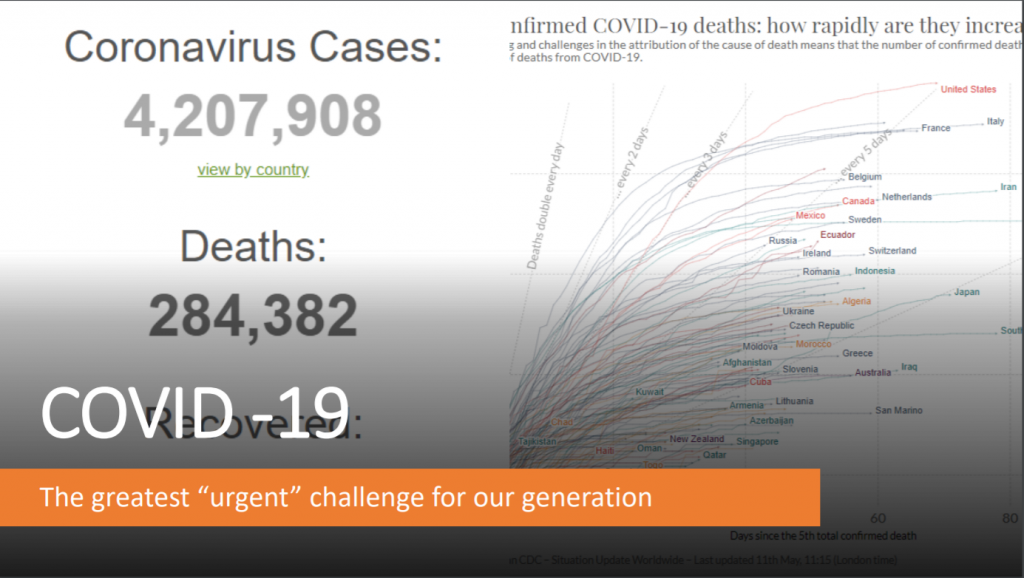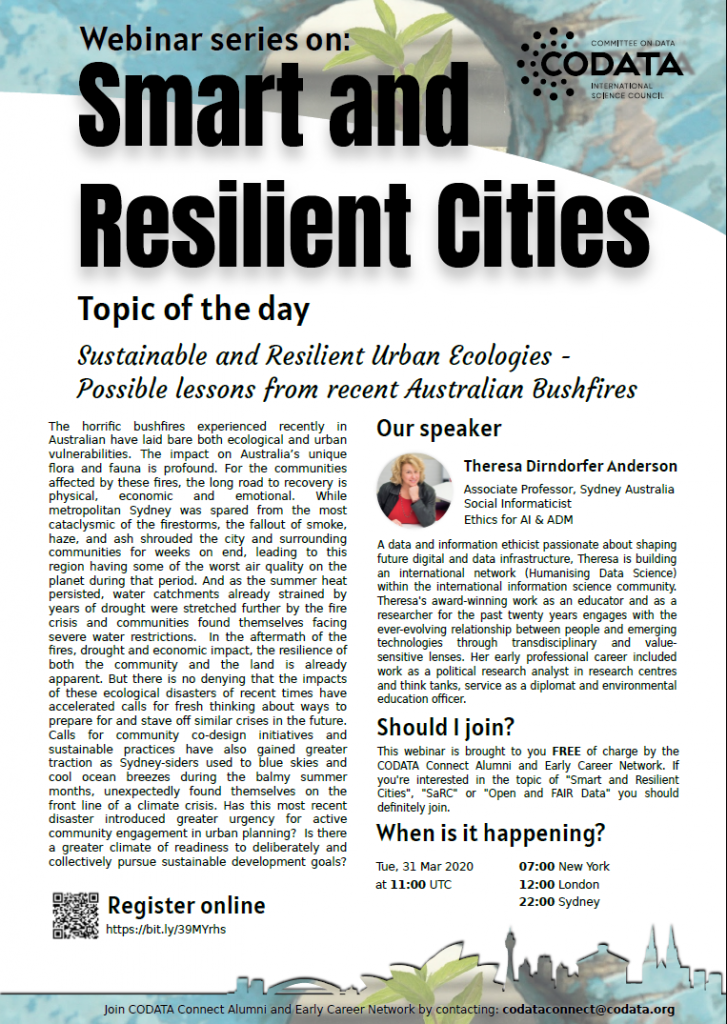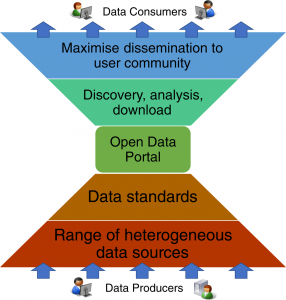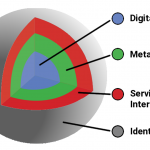On 11th May 2020, a webinar titled “Data Science Enlightening the Path for Resilient Cities to Fight COVID-19: Case studies from Pune (India) and Medellín (Colombia)” was organized by the CODATA Connect Alumni and Early Career Network. This was the second webinar in the series on Smart and Resilient Cities, while other webinars are planned in the coming months throughout 2020. Dr. Shaily Gandhi of the CODATA Connect introduced the speakers and theme of the webinar series. This time, the webinar had two speakers, namely, Mr. Mahesh Harhare and Dr. Jairo Espinosa. As introduced by the Chair, the speaker, Mr. Harhare is the Chief Resilience Officer (CRO) of the Pune Municipal Corporation in India. He holds M.Tech. in Urban Planning and completed Executive Program in Management from IIM Calcutta. As CRO for Pune city, he is a part of the Global Resilient Cities Network (GRCN), formerly 100 Resilient Cities (100RC) program of the Rockefeller Foundation. He is also a member of the Global Steering Committee of select 10 CROs (out of total 85 CROs worldwide), who would steer the Phase II of the GRCN program across the world.
In his presentation, Mr. Harhare shared his experience in coronavirus infection management at Pune city. Pune is among the top ten Indian cities in terms of the number of infected persons with COVID-19 or SARS-COV-2. The COVID-19 situation and subsequent countrywide lockdown resulted in a high impact effect on cities’ economies. He further demonstrated how the city administration responded to COVID-19 management with an evidence-based decision making utilizing data science applications. In this presentation, he shared city-level data on COVID-19 positive cases, containment zones, medical facilities for the patients, civic facilities for the migrant labourers, senior and differentially abled citizens, contact tracking for the high-risk and low-risk contacts, and finally the deadbody management strategies. Most of the presented data were drawn as on 24th April 2020.
As introduced by the Chair, the speaker Dr. Jairo J. Espinosa is a Full Professor at the National University of Colombia in Medellín. For many years he served as R&D Manager in IPCOS N.V. company in Belgium. He completed Ph.D. degree in electrical engineering from the Katholieke Universiteit Leuven in Belgium. His research interests include large scale control systems, intelligent control, nonlinear modeling, model-based predictive control, inferential sensors, and model reduction techniques.
In his presentation titled “Data Science Enlightening the Path for Resilient Cities to Fight COVID-19: A case study of Medellin”, Dr. Espinosa shared data-driven Medellin’s defence tactics monitoring and prediction models, including on the profile of cases of vulnerabilities, monitoring, estimation and prediction of cases, the case locations, social and economical models, and logistics of local hospitals and healthcare institutions. Sharing the transport network capacity and mobility data, the speaker also demonstrated how the Medellin city prepares to end the lockdown and reopen public transport systems and mobility. He concluded with a statement that without vaccine and antiviral medicine, test, data, and models are our best hope for the moment.
Mr. Felix Emeka Anyiam of the CODATA Connect moderated the Question and Answer session, selecting questions posed by online participants using the webinar question tool. Some of the questions were related to how the city-level administrators are prepared to deal with the social and economic interests of the citizens and industries. During the Q&A Session, Mr. Harhare briefly discussed the Pune smart city project and how it contributed to COVID-19 management in the city. Dr. Espinosa briefly narrated how the city-level administrators in Medellin are managing to protect their high-risk, vulnerable communities, amidst the socio-economic uncertainties.
The session was concluded with a vote of thanks presented by Shaily. She also announced the forthcoming activities of the , which include an for the CODATA alumni and early career professionals.
Prepared by:
Anup Kumar Das
(Jawaharlal Nehru University, India, anup_csp@jnu.ac.in)


 On 31st March 2020, a webinar titled “Sustainable and Resilient Urban Ecologies: Possible Lessons from Recent Australian Bushfires” was organized by the CODATA Connect Alumni and Early Career Network. Dr. Shaily Gandhi of the CODATA Connect introduced the speaker and theme of the webinar series. This was the first Webinar in the series on Smart and Resilient Cities, while other webinars are planned in the coming months throughout 2020. As introduced, the speaker Ms. Theresa Dirndorfer Anderson is a data and information ethicist passionate about shaping future digital and data infrastructures. Based in Sydney, Australia, she is an active contributor to local and international initiatives to humanize data science. Theresa’s award-winning work as an educator and as a researcher for the past twenty years engages with the ever-evolving relationship between people and emerging technologies through transdisciplinary and value-sensitive lenses. Her scholarly work involves the fundamental concepts of uncertainty, relevance and resilience. Before her academic career, Theresa worked as an analyst in research centres and think tanks. She has also worked as a diplomat and environmental education officer.
On 31st March 2020, a webinar titled “Sustainable and Resilient Urban Ecologies: Possible Lessons from Recent Australian Bushfires” was organized by the CODATA Connect Alumni and Early Career Network. Dr. Shaily Gandhi of the CODATA Connect introduced the speaker and theme of the webinar series. This was the first Webinar in the series on Smart and Resilient Cities, while other webinars are planned in the coming months throughout 2020. As introduced, the speaker Ms. Theresa Dirndorfer Anderson is a data and information ethicist passionate about shaping future digital and data infrastructures. Based in Sydney, Australia, she is an active contributor to local and international initiatives to humanize data science. Theresa’s award-winning work as an educator and as a researcher for the past twenty years engages with the ever-evolving relationship between people and emerging technologies through transdisciplinary and value-sensitive lenses. Her scholarly work involves the fundamental concepts of uncertainty, relevance and resilience. Before her academic career, Theresa worked as an analyst in research centres and think tanks. She has also worked as a diplomat and environmental education officer.









